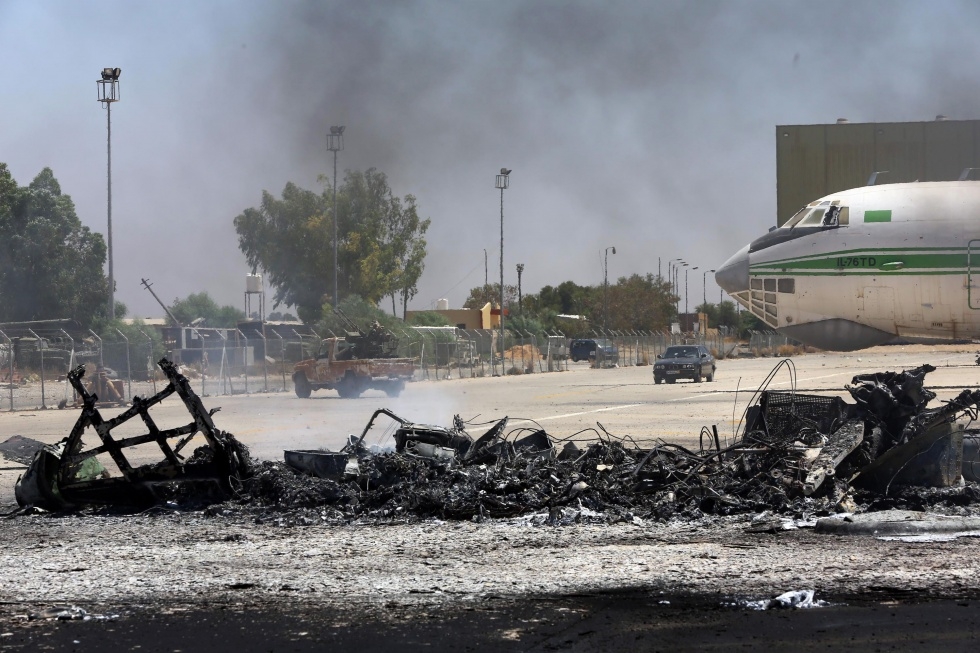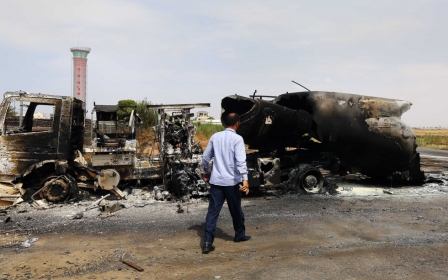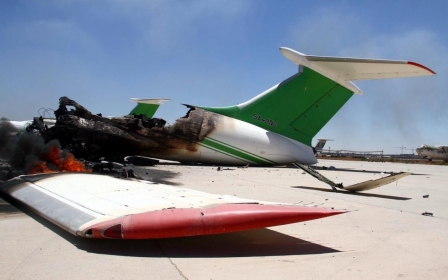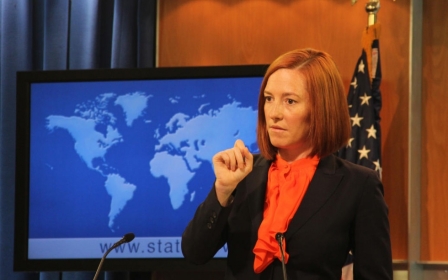Dozens dead as warring militias battle for Tripoli's airport

Militia fighters have stepped up their assault on Libya's main airport, controlled by a rival groups. The fighting has now left 47 people dead in a week, the health ministry said on Monday.
The fighting - which erupted on 13 July and shut Tripoli international airport - also injured 120 people, according to figures released for the week ending 19 July.
A coalition of militias from Misrata in north-west Libya launched an assault on the airport on Sunday, with clashes later spreading along the road to the capital.
By Sunday evening, fighting had subsided around the airport, security official al-Jilani al-Dahesh told AFP, but clashes continued in the western suburbs of the capital, witnesses said.
"The airport was attacked this morning with mortar rounds, rockets and tank fire," Dahesh told AFP.
"It was the most intense bombardment so far."
Dahesh said the militia which controls the airport - based in Zintan, southwest of the capital - responded with heavy fire.
The Misrata-led militias believe the airport is being held illegally by the Zintani brigades. The battle is part of a countrywide struggle between those supportive of more Islamist leaning groups and nationalists.
An airport truce was briefly agreed last week, but the deal broke down and fresh violence broke erupted on Sunday. The EU condemned the violence, which left five civilians dead according to local media.
More than 200 people have been killed during fighting in the eastern city of Benghazi, between forces loyal to rogue general Khalifa Haftar and those opposing his so-called “Operation Dignity” against Islamist-leaning militias like Ansar al-Sharia.
Fighting at Tripoli’s airport has halted all flights and caused extensive damage to planes and airport infrastructure, with aviation officials saying it could be closed for months. Loud explosions were heard in the city centre, 25 kilometres away, as battles raged along the airport road with rockets striking nearby homes.
Pictures posted on social media showed the heavy damage, as plumes of smoke billowed over the airport.
Loud explosions were heard in the city centre, 25 kilometres (15.5 miles) away, as battles raged along the airport road with rockets striking nearby homes.
'No military solution'
At least five civilians were killed in the Qasr Bin Ghashir neighbourhood, Mohamed Abderrahman, from the local town council, told private television channel Al-Nabaa.
The rival sides are among several heavily armed militias which have held sway in the oil-producing North African nation for the past three years.
Relentless violence across Libya this year has sparked fears of all-out civil war and led to international calls for militias to give up weapons.
The EU mission in Libya issued a statement on Sunday urging fighters to lay down their arms and spare civilians.
"The EU is concerned about the protracted conflict over Tripoli international airport and urges all parties to exercise restraint, to abide by international law and to respect civilians," it said.
"The EU calls on all parties to find a peaceful resolution through dialogue and compromise... there is no military solution to the crisis in Libya... the only option is a political solution and a peaceful democratic process."
On 17 July Foreign Minister Mohamed Abdelaziz pleaded for UN help to build up Libya's army and police force and to protect vital sites, including the airport and oil installations.
International pressure to find a solution looks set to increase after the discovery on Monday of the beheaded body of a worker from the Phillipines, who had been kidnapped on 15 July.
The Phillipine Foreign Department alleged that the worker had been singled out from two other workers because he was not a Muslim, saying that ransom negotiations may have taken place when the Phillipine worker was already dead.
Violent struggles between militias are mirrored in politics, where divisions have racked transitional authorities, in particular within the General National Congress (GNC), Libya’s parliament.
Parliamentary elections were held last month, following repeated accusations the GNC were trying to monopolise power.
Results of the vote had been due to be announced Sunday, but the electoral commission announced a delay until Monday.
The growing lawlessness in Libya has alarmed neighbouring states that fear a spill over of violence.
On Saturday, militants attacked a checkpoint on Egypt's border with Libya, killing 22 soldiers, the Egyptian military said.
Cairo has closed the border with Libya and blames the attack on arms smugglers. Egyptian authorities have vowed to tackle “terrorism”, although they have not specified what actions they will take.
New MEE newsletter: Jerusalem Dispatch
Sign up to get the latest insights and analysis on Israel-Palestine, alongside Turkey Unpacked and other MEE newsletters
Middle East Eye delivers independent and unrivalled coverage and analysis of the Middle East, North Africa and beyond. To learn more about republishing this content and the associated fees, please fill out this form. More about MEE can be found here.




